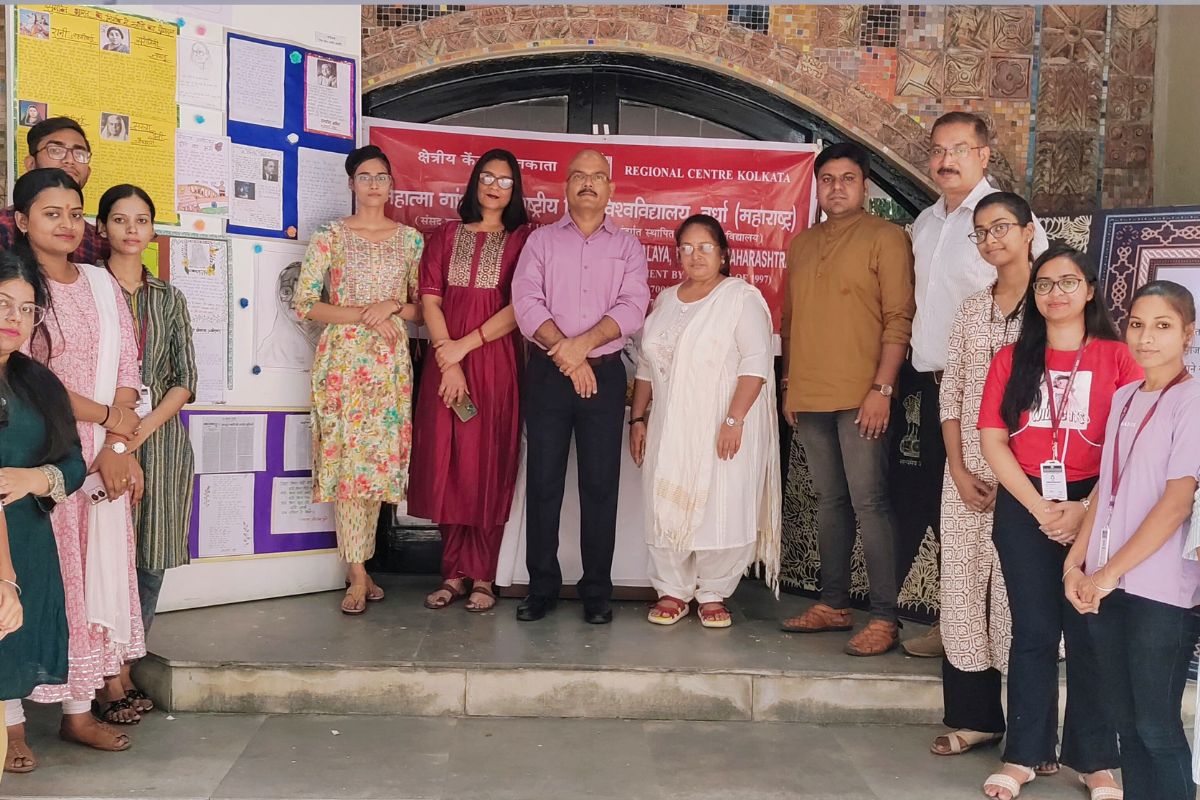
A discussion was organized on Monday on the birth anniversary week of Mahatma Jyotiba Phule, Rashtramata Kastur Gandhi and Baba Saheb Dr. Bhimrao Ambedkar by the regional center of Mahatma Gandhi International Hindi University, Salt Lake, Kolkata. On this occasion, center in-charge Dr. Chitra Mali unveiled the mural magazine for the month of April. Bhitti Patrika was coordinated by Jyoti Agrahari and Riya Sao. Dr. Chitra Mali said that social change is possible only through education.
Gave information about the efforts of Mahatma Jyotiba Phule
Dr. Chitra Mali, in-charge of the centre, gave information about the efforts made by Mahatma Jyotiba Phule for women’s education, the establishment of Satyashodhak Samaj, its objectives and the structure of the society. He said that Rashtramata Kastur was a pivot between Gandhi and his son Harilal. He referred to the book ‘The Forgotten Woman’ written by Arun Gandhi and his wife Sunanda Gandhi in depth on every aspect of the life of their grandmother (Kasturba Gandhi). He said that perhaps he too felt sad that his grandmother’s contribution and role in the anti-colonial movement had been neglected. He said that before this, Vanmala Parikh and Sushila Nayyar also wrote a book on Kastur in Gujarati ‘Hamari Ba’, in which the hard work of Kasturba’s family life and political life has been shown. He said that the tradition of history writing is also not beyond the concepts of caste, class and gender. Here too, there has been discrimination in describing the work of women and this discrimination continues even today.
Recitation of story and poem in discussion
In the discussion, Aparna Singh, student of MA Hindi Literature second semester, recited her story written on Kasturba and Anjali Tiwari, Prabhakar Pandey, Priya Kumari Prasad and Jyoti Chaudhary recited their self-written poems. Student Rupal Gupta recited Uma Sharma’s poem. Aditi Dubey, a student of fourth semester, recited the poem of Omprakash Valmiki.
ALSO READ: WB News: Building department meeting today in Gardenreach case
Mentioned the efforts of Jyotiba Phule
Assistant Professor of the Centre, Dr. Abhilash Kumar Gond said that the thinking of Jyotiba Phule and Dr. Bhimrao Ambedkar should not be limited to Dalit discussion only. There is a need to understand his thinking in universality, so that the concept of entire human welfare can be understood. He also mentioned the ashrams built by Jyotiba Phule for women and children and their objectives.
Without education, slavery of untouchables and women will not end.
The discussion was presided over by Dr. Amit Rai, Associate Professor of the Centre. In his presidential address, he expressed his views on the implication of words like Mahatma, Rashtramata and Mahamanav associated with Mahatma Jyotiba Phule, Rashtramata Kastur and great man Dr. Bhimrao Ambedkar. He said that in the history of India, there were only two Mahatmas before Gandhi, the first Mahatma was Tathagat Gautam Buddha and the second Mahatma was Jyotirao Phule. Jyotiba Phule was introduced to the writings of Thomas Paine at the age of just twenty. Especially after reading his book ‘Right of Man’, he was greatly influenced and became a fan of armed revolution. In 1848, the same year in which the Communist Party Manifesto of Karl Marx and Engels was published in the West, Phule started the first school for untouchable girls. He clearly believed that without education the slavery of untouchables and women cannot end.
This is how he got the title of Mahatma
Associate Professor Dr. Amit Rai said that on May 11, 1888, a program to honor Mahatma Phule was organized in Koliwada, Mumbai. For this, a large number of untouchables and Shudras were present from all over Maharashtra. In this grand ceremony, Jyotirao Govindrao Phule was honored with the title of ‘Mahatma’ in the presence of thousands of hardworking people. It is important that behind the title of ‘Mahatma’ given to Phule, there was neither any ruler nor any capitalist. Phule was a theist and like Gandhi, he called his truth ‘Creator’ instead of ‘Truth is God’. He believed that the ‘Creator’ has created the earth’s resources and means of happiness for everyone. There should be such a system that everyone has equal access to them, because without doing so, human life cannot be meaningful and beautiful. Mahatma Phule’s idea of truth is practical. He said that the idea of looking at the Indian society in a realistic manner was expressed not only by Mahatma Phule but also by all the social reformers from Raja Rammohan Roy to Dr. Babasaheb Ambedkar. Along with the students of the center, Assistant Professor of the Center Dr. Richa Dwivedi, Section Officer Dr. Alok Singh, employee Rita Baidh were present in the discussion. The discussion was moderated by Jyoti Agrahari and vote of thanks was given by Riya Sao.
